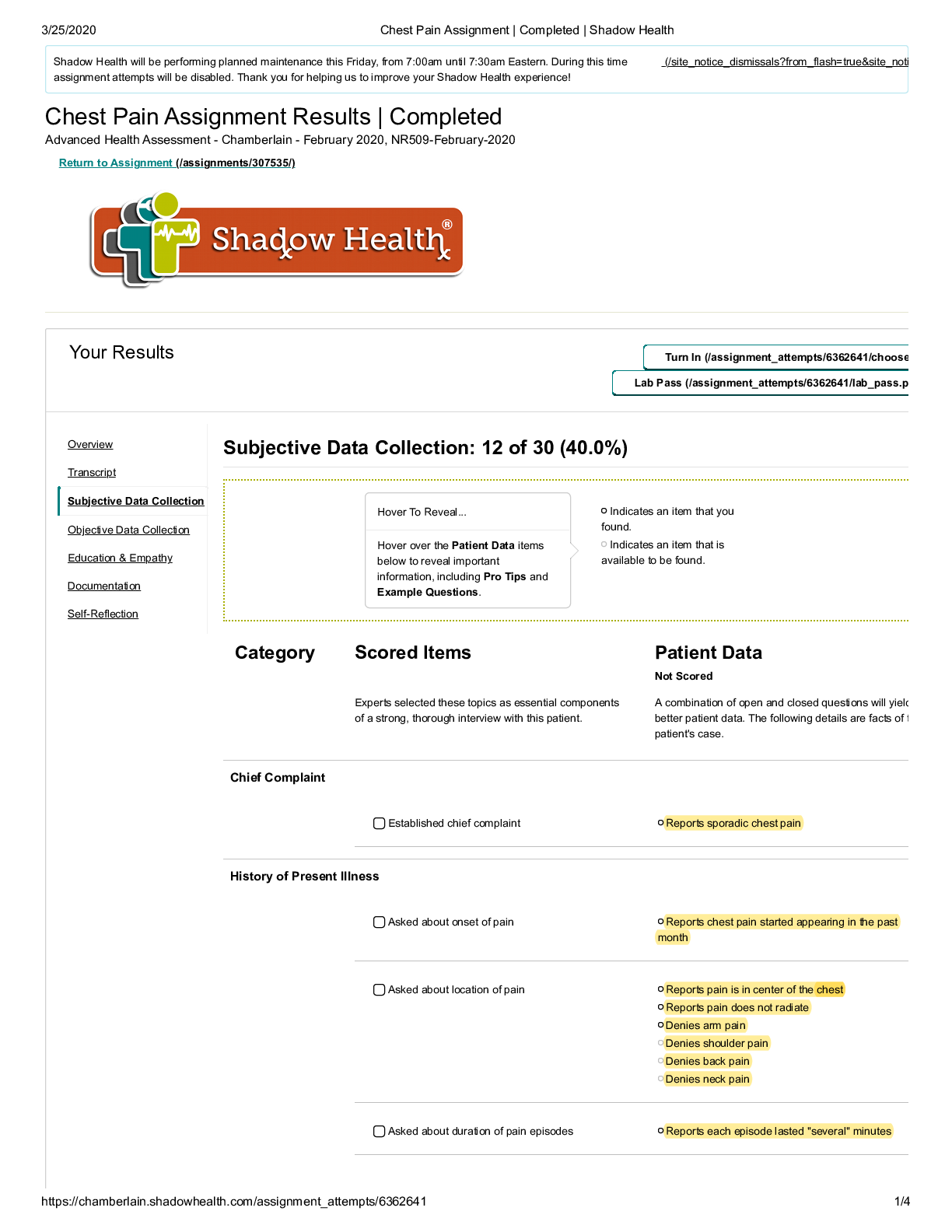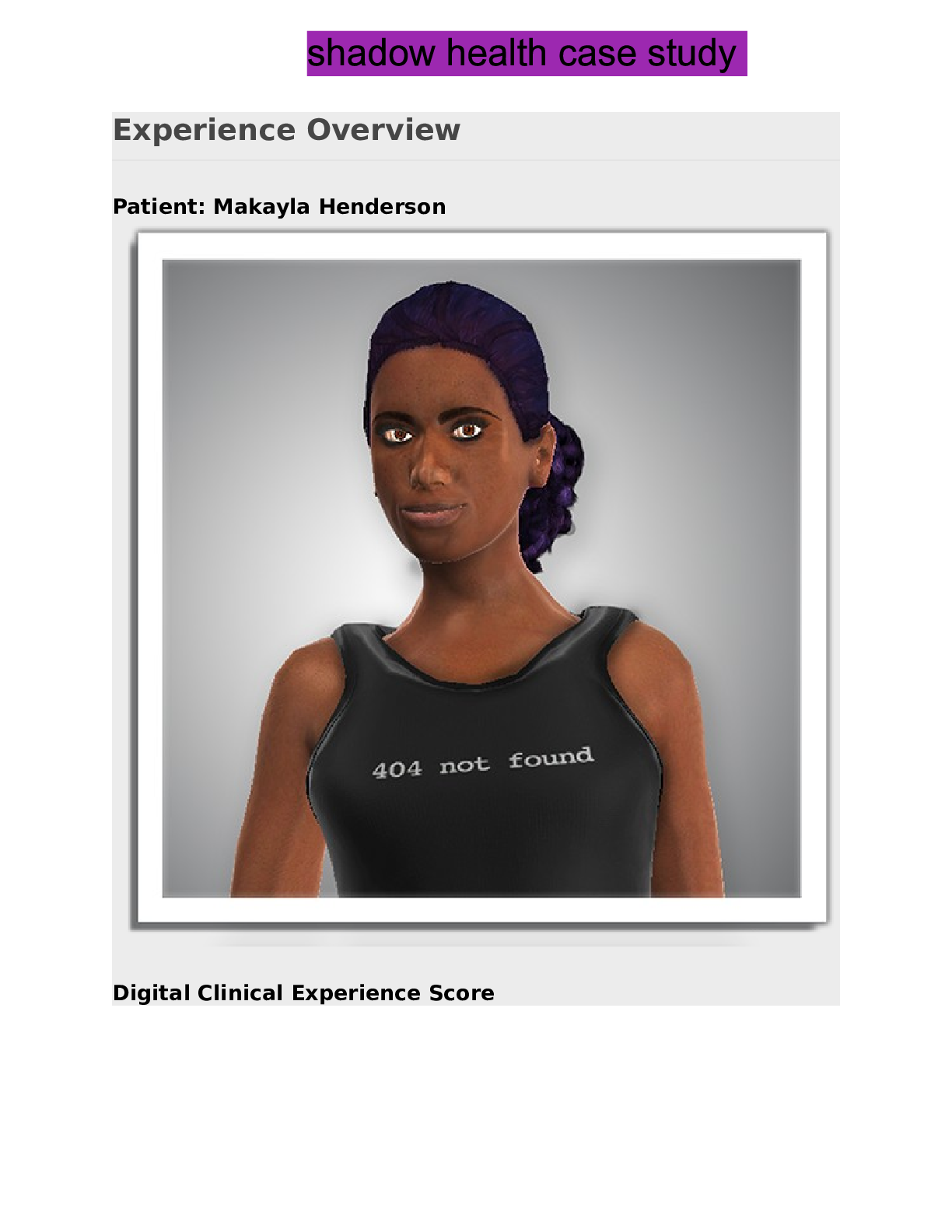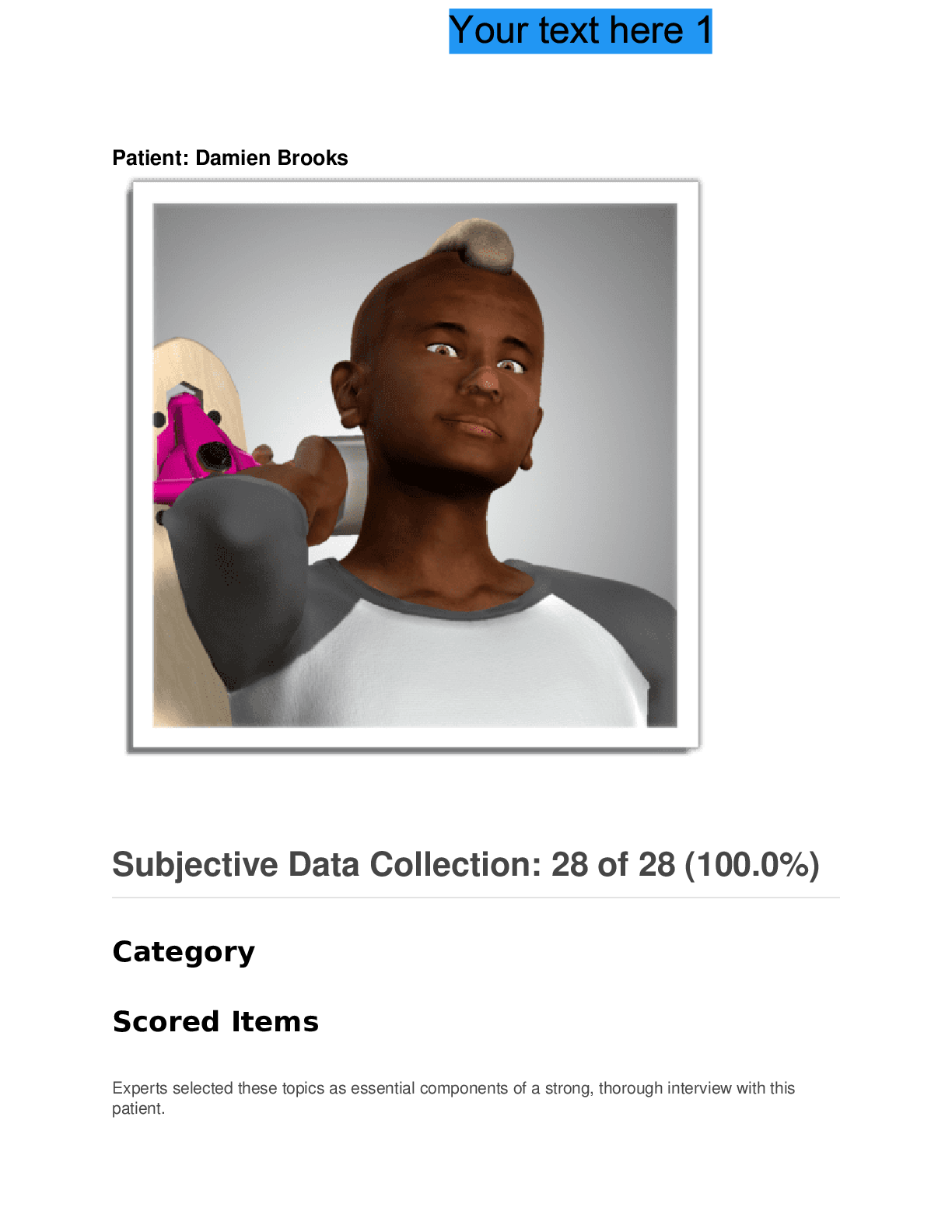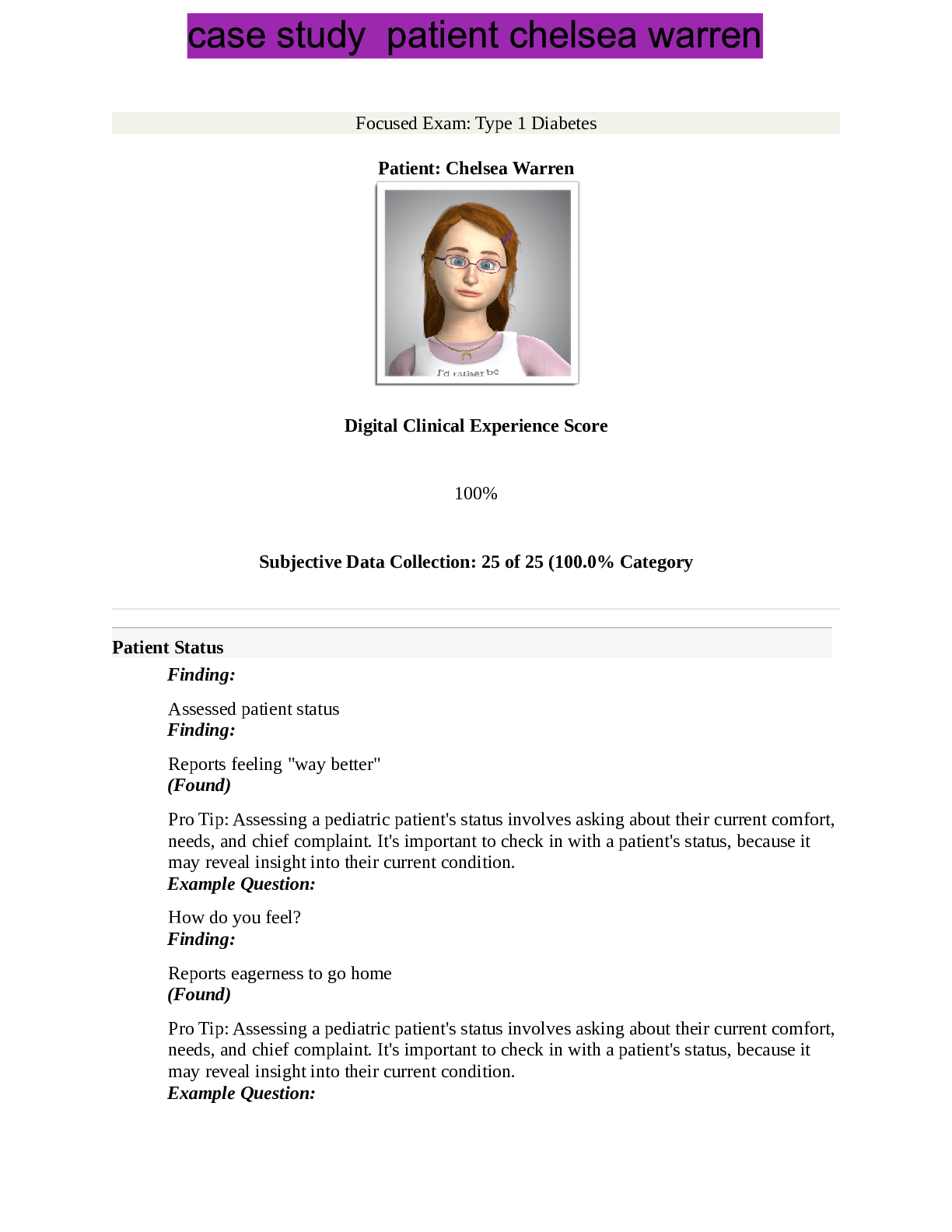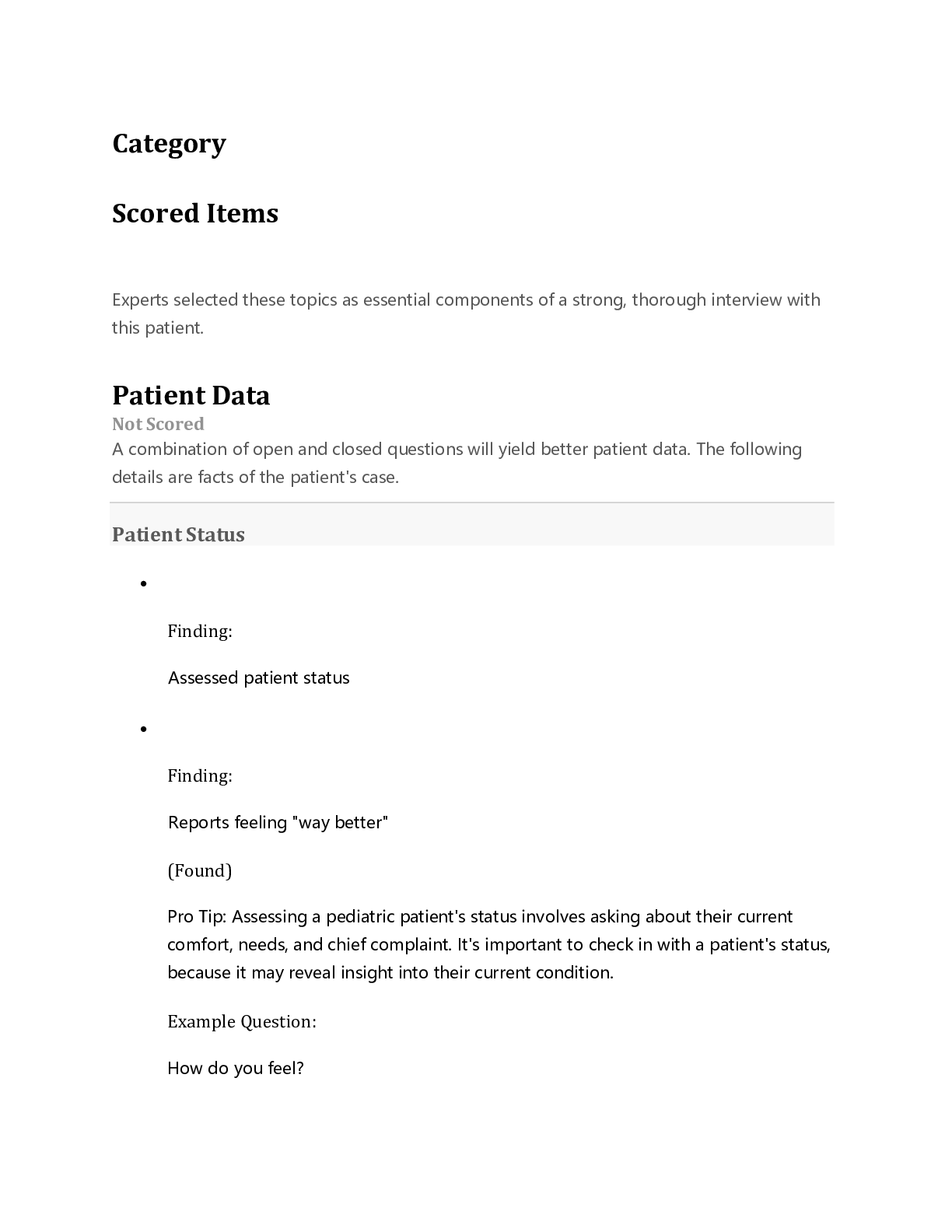Health Care > SHADOW HEALTH > Questions for shadow health- respiratory for tina History of Present Illness (All)
Questions for shadow health- respiratory for tina History of Present Illness
Document Content and Description Below
Pro Tip: Foundational questions about general well-being are important in assessing how a patient feels at the current moment. This creates a space for Tina to contextualize her current feeling in re... lation to a chief complaint. Example Question: What brings you in today? Finding: Asked about reasons for seeking treatment Finding: Reports worry that inhaler "isn't working like it usually does" (Available) Pro Tip: Initially establishing a chief complaint allows the patient to express their reason for seeking care, primary concerns, or condition they are presenting with. Example Question: Why did you decide to seek treatment? Finding: Believes breathing problems triggered by asthma exacerbation (Available) Pro Tip: Questions about what factors might have caused an illness can point to a patient's environmental stressors, habits, and general wellbeing. Asking Tina what caused her asthma might indicate her health literacy and understanding of what factors impact her breathing. Example Question: What do you think caused your illness? Finding: Asked about current breathing Finding: Reports current breathing is normal (Found) Pro Tip: Foundational questions about general well-being are important in assessing how a patient feels at the current moment. This creates a space for Tina to contextualize her current feeling in relation to a chief complaint. Example Question: Are you having difficulty breathing right now? Finding: Asked about symptoms during asthma exacerbation Finding: Describes exacerbation symptoms as chest tightness and "can't take in air" (Found) Pro Tip: Symptoms often vary from patient to patient. Asking Tina to describe what happens when her asthma acts up will indicate how her individual symptoms manifest. Example Question: What happens when your asthma acts up? Finding: Reports asthma severity as "not full attack," but worse than usual (Available) Pro Tip: Asthma severity might change over time for a variety of reasons. Asking Tina about the severity of her asthma will allow her to assess her condition. Example Question: How severe is your asthma? Finding: Reports audible wheeze during asthma exacerbation (Available) Pro Tip: Some people who experience chronic asthma may be accustomed to wheezing and, as a result, might not volunteer this information. Asking Tina if she's been wheezing illustrates how her asthma is presenting. Example Question: Do you wheeze during an asthma exacerbation? Finding: Reports audible wheeze lasting 5 minutes during asthma exacerbation (Available) Pro Tip: Some people who experience chronic asthma may be accustomed to wheezing and, as a result, might not volunteer this information. Asking Tina how long her wheezing lasts illustrates how her asthma is presenting. Example Question: How long does your wheezing usually last? Finding: Reports no post nasal drainage with asthma exacerbation (Available) Pro Tip: Post-nasal drip can worsen already exacerbated asthma. Soliciting information about Tina's sinuses will point to additional factors that are triggering Tina's breathing problems. Example Question: Do you have postnasal drainage when you have breathing problems? Finding: Reports no chest pain during asthma exacerbation (Found) Pro Tip: Symptoms often vary from patient to patient. Asking Tina whether she experiences chest pain during an attack will indicate how her individual symptoms manifest. Example Question: Are the shortness of breath episodes associated with chest pain? Finding: Asked about asthma management Finding: Reports feeling asthma is less controlled recently (Available) Pro Tip: The frequency of asthma episodes or shortness of breath might vary over time. Asking Tina about her recent experience will expound upon her current condition. Example Question: How well do you feel your asthma is controlled? Finding: Reports asthma has been interfering with activities of daily life (Available) Pro Tip: Severe asthma can interfere with daily life. Asking Tina the degree to which asthma impacts her daily life can be illustrative of the relative severity of her asthma. Example Question: Is there anything you can't do because of your asthma? Finding: Reports no record keeping of asthma exacerbation or shortness of breath episodes (Available) Pro Tip: For some patients, keeping records of asthma exacerbation allows them to monitor their conditions. Soliciting this information from Tina will show health literacy. Example Question: Do you use a chart to monitor your asthma? Finding: Reports no peak flow meter usage (Available) Pro Tip: A peak flow meter measures how well a patient's lungs can expel air. By asking whether Tina uses a peak flow meter, you are asking about her health literacy and what kind of medical tools she uses to manage her asthma. Example Question: Do you check your peak flow regularly? Finding: Reports no nebulizer use (Available) Pro Tip: The medication that a patient takes reveals a current treatment plan and healthcare access. Asking Tina if she uses a nebulizer for her asthma will indicate her treatment plan and the degree to which she complies with it. Example Question: Do you use a nebulizer? [Show More]
Last updated: 2 years ago
Preview 1 out of 25 pages

Buy this document to get the full access instantly
Instant Download Access after purchase
Buy NowInstant download
We Accept:

Reviews( 0 )
$8.50
Can't find what you want? Try our AI powered Search
Document information
Connected school, study & course
About the document
Uploaded On
May 15, 2023
Number of pages
25
Written in
Additional information
This document has been written for:
Uploaded
May 15, 2023
Downloads
0
Views
97

